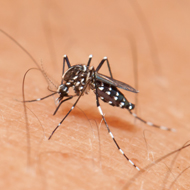Zika: WHO evaluates mosquito controls

Zika outbreaks are thought to be linked to serious birth defects and a rise in cases of
Guillain-Barré syndrome.
Guillain-Barré syndrome.
The World Health Organisation (WHO) is evaluating a suite of new methods to control mosquito populations in a bid to tackle Zika virus, which is primarily spread by the Aedes aegypti mosquito.
Current possibilities include the introduction of genetically modified mosquitoes, or sterile male insects to suppress the population.
Zika was recently declared a global health emergency as it spread across the Americas. The outbreaks are thought to be linked to serious birth defects and a rise in cases of the autoimmune disorder, Guillain-Barré syndrome, though this has not yet been scientifically proven.
While 15 groups are currently working to develop a vaccine, WHO predicts it could take at least 18 months before large-scale trials can take place. With this in mind, the organisation is recommending better mosquito control as the best line of defence.
WHO has convened a vector control advisory group to consider new tools, including GM mosquitoes, which have previously been trialled in the Cayman Islands resulting in a significant decline in mosquito populations.
The group is backing further field trials and risk assessment to look into the potential impact on disease transmission.
Another strategy being developed is the release of sterile male insects so that when females mate with them, their eggs are not viable and the insect population dies out.
The release of males carrying the naturally occurring Wolbachia bacteria is another option. The bacteria does not affect humans or other mammals but prevents mosquito eggs hatching when females mate with affected males.
A different strain reduces the insect's capacity to spread dengue virus. Mosquitoes carrying the bacteria have already been released in a number of places, including Australia, Brazil, Indonesia and Vietnam as part of dengue control programmes. Large-scale field trials are expected to begin soon.
Meanwhile, WHO advocates the elimination of mosquito breeding sites as an effective intervention, as well as the use of insect repellents.
For more of the WHO's guidance, see: http://www.who.int/emergencies/zika-virus/articles/mosquito-control/en/



 The BSAVA has opened submissions for the BSAVA Clinical Research Abstracts 2026.
The BSAVA has opened submissions for the BSAVA Clinical Research Abstracts 2026.